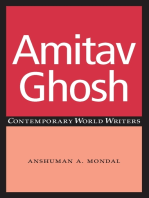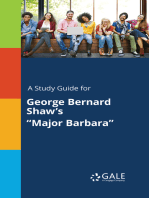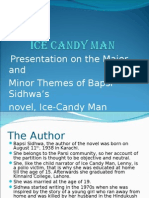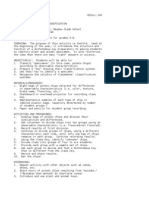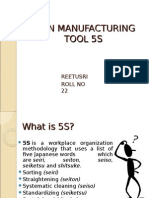International Journal of Humanities and Social Science Invention (IJHSSI
International Journal of Humanities and Social Science Invention (IJHSSI
Uploaded by
inventionjournalsCopyright:
Available Formats
International Journal of Humanities and Social Science Invention (IJHSSI
International Journal of Humanities and Social Science Invention (IJHSSI
Uploaded by
inventionjournalsCopyright
Available Formats
Share this document
Did you find this document useful?
Is this content inappropriate?
Copyright:
Available Formats
International Journal of Humanities and Social Science Invention (IJHSSI
International Journal of Humanities and Social Science Invention (IJHSSI
Uploaded by
inventionjournalsCopyright:
Available Formats
International Journal of Humanities and Social Science Invention ISSN (Online): 2319 7722, ISSN (Print): 2319 7714
14 www.ijhssi.org Volume 2 Issue 10 October. 2013 PP.45-46
Social protest in Coolie
Abhinav Ahlawat
1
,Research Scholar Baba Mastnath University, Rohtak
Mulk raj Anand is pioneer of Indian novel written in English. His three novels Untouchables (1935), Coolie (1936) and Two leaves and a bud (1937) were produced in quick succession, and being the product of what he called the pink decade. Coolie is a sequel to Anands first novel. The canvas of the novel is wider and more varied. Coolie is truly a picaresque novel, an epic of thousands of coolies in India. Criticism of society is prevalent essentially in all literatures. Mulk raj Anand wrote to denounce the society based on all kinds of distinctions- of caste, color, creed, and last but not the least, the distinction between rich and poor. Munoo, the central character of the novel, is the poorest of the poor. The novel mainly focuses on the distinction of rich and poor. Munoo, to begin with, is a child, and that too an orphan, whose parents died in utter poverty, leaving him nothing to fall back upon. He was hardly fourteen when he was engaged in the domestic help by his uncle and aunty. The novel opens with his aunt calling for him to hurry up as his uncle is shortly to depart for the town of Sham Nagar where the boy is to be engaged as a servant in the house of Babu Nathoo Ram, a clerk in the Imperial Bank of India, where his uncle worked as a peon. His name is Munoo but his uncle alternatively calls hi Mandu, a child servant, in the hills and the Punjab. No wonder munoo has already become Mandu in his uncles house, as he gazes cattles. As a Novelist with a mission of reorganizing society in a way that would be of lasting benefit to all classes of people, Anand is not against work, but labor that takes away the play of ones childhood, or aspirations of ones youth or the dignity of ones old age. Munoo is engaged as a servant as if orphans and the poor were destined to work as slaves. Ispo facto, the social set up as sketched in the novel, is a slave order. He is not the only child servant but there are many more Munoos working in the neighboring houses. It appears as if servility is fated. His uncle is a slave to clerk, clerk to chief cashier and chief cashier to the manager of the bank. Anand is not against order in any society, but he protest against slavery which people accept as given. Incidentally, India was a slave country when the novel was written. Many of the coolies in Bombay are from hills. In reply to Munoos question as to how the town people get their food in absence of fields, his uncle said:They earn money by buying wheat which the peasants grow and by selling of flour to the sarkar, or by buying cotton and making cloth and selling it for profit. Some of them become babu who works in the offices, like the babu in whose house you are going to be a servant.India has always been and stills an agrarian country. Because the hills are not agriculturally viable, coolies flock from hills to work in towns. This novel is mere not a story of one coolie, but all those who in their poverty are reduced to this status. It is thus about all the coolies, however different their religion or caste. Coolie thus is a generic term for all those menials- whether they work as domestic servants or carry load or work in factories or even pull rickshaws. Munoo does all the jobs of a coolie and is therefore representative of all coolies. Other kind of discrimination is not shown in the novel except slavery. Anand is particularly protesting against the rich. Society, as Anand visualized, did not originate from the Hobbsian war of one against all, but rather from instruct of social sympathy, particularly in a family. Munoo was also loved by his aunt; she would take him into her lap as did Prabhati, and later Luxmi. It is true that egoistic instinct in human beings grow str onger than social sympathy. Munoos aunt had yet no child. She wished to love him as her own son. But her desire to have her own son made her push Munoo to servitude. Prabhati and Prabha thought of adopting the boy, but they, guided by the original instinct, did not bring themselves to adopt Munoo. Same is the case with Gujri, she would like to have her respective son rather than adopt Munoo. Mrs. Mainwaring, being a liberated woman, wanted to flirt that with Munoos body but had reservations regarding his status as a servant. There is always confusion between egoism and altruism, especially in Indian society. It is a rare practice that any of the society is developed to an extent to regard social ties on the family lines. There are lines of social discrimination even in the British society. It could not accept Mrs. Mainwaring unto its fold. Her complexion was dusky, as her mother was an Indian washer woman. This is another level of discrimination. Mrs. Mainwaring was crying for acceptance by the English. She called England her home. And for the same reason she married an English man and later on when her husband was arrested, she divorced him to marry an
www.ijhssi.org
45 | P a g e
Social Protest In Coolie
Indian Muslim. Munoo too likes Mrs. Mainwaring is a victim of romance of the color of skins. He was completely spell-bound when he saw her white skin. It is a curious fact of racial and social discrimination that the higher order, the rich, the higher caste people, are romanticized by those who are the victim of same order. Munoos sense of wonder in this regard is inexhaustible. He is never disillusioned. He thinks of them as super human and this makes him long to be of their kind, he thinks that he is fated to be a poor. Thus, the divide between the rich and the poor, as of the race, color and creed, he feels is infallible. Nevertheless, Anand is not as hopeless as munoo is. He believes that with the development of intelligence mankind will be able to realize that the whole society is a big family. But Anand is not a nave optimist. He knows social consolidations other than the family are difficult to sustain, and they are indispensible. Anand seems to think that the problem of social cooperation in an industrial society is primarily intellectual and moral, and same are the thoughts of F.R Leavis and T.S Eliot. Anands protest against the society based on discrimination is, therefore, not violent. A classless society is a new concept sought to be established in the existing structures of caste, color, and creed. Anand thus protested against human thinking which is muddled because of the co-existence of the old. Munoo is a victim of social apathy because society as a whole has yet to enter the positive stage of mutual sympathy. Anand is a sociologist and historian of society. The world according to Munoo is divided into two classes- the rich and the poor. To be poor is as bad a stigma to be lowly born. In spite of his tender years, supple body and dark eyes; he is still regarded as an untouchable. He is far apart from rich just because of his poverty. He is an untouchable in the class conscious world. He is to be a slave whether the country is rural, or urban, feudal or modern. Munoo equally grows conscious of his own status. Unfortunately we have inherited this metaphysical thinking that nature does this or that, that laws of nature are good etc. from the days of enlightenment. Rousseau and Romantics then carried it over into their social contract, natural right, the sovereignty of the people. Derrida calls this privileging of nature over culture an ethic of nostalgia, for origins, an ethics of archaic and natural innocent. Such privileging creates a centerthe privileged position, as, for example, of rich over the poor, resisting the freeplay between the two. Anand in his novel Coolie, protest against this privileging of the rich.
REFRENCES
[1] [2] [3] [4] Cowasjee, Saros. Mulk Raj Anand: Coolie: An Assessment. 1976. Print. Berry, Margaret. Mulk Raj Anand: The Man and the Novelist. 1971. print. Gupta, G.S.Balaram. Mulk Raj Anand: A Study of His Fiction in Humanist Perspective. 1974. print. Paul, premila. The Novels of Mulk Raj Anand: A Thematic Study. 1983. print.
www.ijhssi.org
46 | P a g e
You might also like
- CHCAGE005 Dementia SupportDocument27 pagesCHCAGE005 Dementia SupportAshesh Basnet100% (5)
- Field Notes from a Waterborne Land: Bengal Beyond the BhadralokFrom EverandField Notes from a Waterborne Land: Bengal Beyond the BhadralokNo ratings yet
- A Study Guide for Isabel Allende's "The Daughter of Fortune"From EverandA Study Guide for Isabel Allende's "The Daughter of Fortune"Rating: 5 out of 5 stars5/5 (1)
- Satellite Castes and Dependent Relations: Dalits in South IndiaFrom EverandSatellite Castes and Dependent Relations: Dalits in South IndiaNo ratings yet
- Young India: An interpretation and a history of the nationalist movement from withinFrom EverandYoung India: An interpretation and a history of the nationalist movement from withinNo ratings yet
- Claiming Space: Racialization in Canadian CitiesFrom EverandClaiming Space: Racialization in Canadian CitiesNo ratings yet
- EnglishDocument2 pagesEnglishPriyankaNo ratings yet
- Mulk Raj AnandDocument3 pagesMulk Raj AnandatalkNo ratings yet
- Mulk Raj Anand's CoolieDocument20 pagesMulk Raj Anand's CoolieKarthikNo ratings yet
- Deeksha EngDocument24 pagesDeeksha EngDeeksha TripathiNo ratings yet
- Social Conflicts in Mulk Raj Anand's CoolieDocument4 pagesSocial Conflicts in Mulk Raj Anand's CoolievaradsanketNo ratings yet
- Marginalisation of Indigent in CoolieDocument5 pagesMarginalisation of Indigent in CooliepriyankaNo ratings yet
- 7 Ijelaug20197 PDFDocument6 pages7 Ijelaug20197 PDFTJPRC PublicationsNo ratings yet
- Book ReviewDocument4 pagesBook ReviewAshwina YadavNo ratings yet
- 9216-Article Text-9856-1-10-20191016Document7 pages9216-Article Text-9856-1-10-20191016Siddhi Anil MadaniNo ratings yet
- Depiction of Caste Annihilation and Class Abrogation in Mulk Raj Anand's UNTOUCHABLE and COOLIEDocument4 pagesDepiction of Caste Annihilation and Class Abrogation in Mulk Raj Anand's UNTOUCHABLE and COOLIEDilkesh Gangwar100% (2)
- Mulk Raj Anand As A NovelistDocument4 pagesMulk Raj Anand As A Novelistatalk100% (2)
- Use of Realism in Mulk Raj Anand's Novels: Karan SharmaDocument2 pagesUse of Realism in Mulk Raj Anand's Novels: Karan SharmasirajahmedsNo ratings yet
- Coolie The Marxist ApproachDocument4 pagesCoolie The Marxist ApproachpriyankaNo ratings yet
- Two Leaves and A Bud FinalDocument8 pagesTwo Leaves and A Bud FinalVinaya BhaskaranNo ratings yet
- Coolie by Mulk Raj AnandDocument30 pagesCoolie by Mulk Raj AnandKarthikNo ratings yet
- 07 Chapter 3Document72 pages07 Chapter 3Md Aamir SiddiquiNo ratings yet
- A Sordid Reality in the World of Dalits- a Critical Study of Mulk Raj Anand’s Coolie and Untouchable With an Evaluation of Wretched Condition in Arundhati Roy’s the God of Small Things by Mukesh KumarDocument6 pagesA Sordid Reality in the World of Dalits- a Critical Study of Mulk Raj Anand’s Coolie and Untouchable With an Evaluation of Wretched Condition in Arundhati Roy’s the God of Small Things by Mukesh Kumarijr_journalNo ratings yet
- KajalDocument58 pagesKajaldwivediarti226020No ratings yet
- Manifestation of Exploitation in MRA UntouchableDocument10 pagesManifestation of Exploitation in MRA Untouchablesanjay kumarNo ratings yet
- Review On Munshi Premchands Writings WitDocument7 pagesReview On Munshi Premchands Writings WitSaraNo ratings yet
- Societal Contexts in The Writings of Arundhati Roy: Jaya Dwivedi & Swarnita SharmaDocument6 pagesSocietal Contexts in The Writings of Arundhati Roy: Jaya Dwivedi & Swarnita SharmaTJPRC PublicationsNo ratings yet
- JETIR1902C83Document6 pagesJETIR1902C83nimishaNo ratings yet
- Marginality and Postcolonialism in Kiran DesaiDocument9 pagesMarginality and Postcolonialism in Kiran DesaiDebayan BasuNo ratings yet
- Ice Candy Man PresentationDocument22 pagesIce Candy Man PresentationNMK@KC82% (34)
- Ethnicity - Vol.2 - in Sellected NarrativesDocument103 pagesEthnicity - Vol.2 - in Sellected Narrativessaurabh pantNo ratings yet
- 2217 2443 1 PBDocument6 pages2217 2443 1 PBkarthicshajiuppuveettilNo ratings yet
- Effects of Online Marketing On The Behaviour of Consumers in Selected Online Companies in Owerri, Imo State - NigeriaDocument12 pagesEffects of Online Marketing On The Behaviour of Consumers in Selected Online Companies in Owerri, Imo State - Nigeriainventionjournals100% (1)
- Inter-Caste or Inter-Religious Marriages and Honour Related Violence in IndiaDocument5 pagesInter-Caste or Inter-Religious Marriages and Honour Related Violence in IndiainventionjournalsNo ratings yet
- A Critical Survey of The MahabhartaDocument2 pagesA Critical Survey of The MahabhartainventionjournalsNo ratings yet
- Student Engagement: A Comparative Analysis of Traditional and Nontradional Students Attending Historically Black Colleges and UniversitiesDocument12 pagesStudent Engagement: A Comparative Analysis of Traditional and Nontradional Students Attending Historically Black Colleges and Universitiesinventionjournals100% (1)
- The Usage and Understanding of Information and Communication Technology On Housewife in Family Welfare Empowerment Organization in Manado CityDocument10 pagesThe Usage and Understanding of Information and Communication Technology On Housewife in Family Welfare Empowerment Organization in Manado CityinventionjournalsNo ratings yet
- Effect of P-Delta Due To Different Eccentricities in Tall StructuresDocument8 pagesEffect of P-Delta Due To Different Eccentricities in Tall StructuresinventionjournalsNo ratings yet
- Non-Linear Analysis of Steel Frames Subjected To Seismic ForceDocument12 pagesNon-Linear Analysis of Steel Frames Subjected To Seismic ForceinventionjournalsNo ratings yet
- Non-Linear Analysis of Steel Frames Subjected To Seismic ForceDocument12 pagesNon-Linear Analysis of Steel Frames Subjected To Seismic ForceinventionjournalsNo ratings yet
- Effect of P-Delta Due To Different Eccentricities in Tall StructuresDocument8 pagesEffect of P-Delta Due To Different Eccentricities in Tall StructuresinventionjournalsNo ratings yet
- Immobilization and Death of Bacteria by Flora Seal Microbial SealantDocument6 pagesImmobilization and Death of Bacteria by Flora Seal Microbial SealantinventionjournalsNo ratings yet
- A Novel Bayes Factor For Inverse Model Selection Problem Based On Inverse Reference DistributionDocument4 pagesA Novel Bayes Factor For Inverse Model Selection Problem Based On Inverse Reference DistributioninventionjournalsNo ratings yet
- Inter-Caste or Inter-Religious Marriages and Honour Related Violence in IndiaDocument5 pagesInter-Caste or Inter-Religious Marriages and Honour Related Violence in IndiainventionjournalsNo ratings yet
- A Study Guide To The Crisis of Caring: Recovering The Meaning of True FellowshipDocument22 pagesA Study Guide To The Crisis of Caring: Recovering The Meaning of True FellowshipfibookNo ratings yet
- Literature 1-Hong Kong Design InstituteDocument25 pagesLiterature 1-Hong Kong Design InstituteNarmatha KamalNo ratings yet
- NSPE - Tips To Passing PE Exam-Static IndeteriminateDocument54 pagesNSPE - Tips To Passing PE Exam-Static Indeteriminategilla2010No ratings yet
- MonthlyDocument33 pagesMonthlyProtim BharatiNo ratings yet
- Democracy in Brief - in Brief Series - English - Hi ResDocument84 pagesDemocracy in Brief - in Brief Series - English - Hi ResPhan Đào Hoàng HiệpNo ratings yet
- Faulty ParallelismDocument1 pageFaulty Parallelismailyn joy mañacapNo ratings yet
- Goravani New BookDocument58 pagesGoravani New BookParampara108No ratings yet
- Si Ci 100 Ques With SolnDocument20 pagesSi Ci 100 Ques With SolnJason WestNo ratings yet
- JEE Advanced 2017 Paper 1 Question Paper With Solutions and Answer Key PDFDocument27 pagesJEE Advanced 2017 Paper 1 Question Paper With Solutions and Answer Key PDFঋতজিৎ পালNo ratings yet
- SC-350 User ManualDocument38 pagesSC-350 User ManualplottersublimNo ratings yet
- Project Smart ShoeDocument9 pagesProject Smart ShoeKashif AliNo ratings yet
- Daftar Matakuliah Psikologi UiciDocument8 pagesDaftar Matakuliah Psikologi UiciPikri AlamsyahNo ratings yet
- TRENDs Activity-Sheet-5-Q4 With Quarter 4 NotesDocument8 pagesTRENDs Activity-Sheet-5-Q4 With Quarter 4 Notesarchival diapana644No ratings yet
- TDS Byk-023 en PDFDocument2 pagesTDS Byk-023 en PDFHiroshi PhanNo ratings yet
- African Philosophy and ThoughtDocument4 pagesAfrican Philosophy and Thoughtpeter100% (1)
- B9 - High Power Contactors (Ref) enDocument44 pagesB9 - High Power Contactors (Ref) enPablo Andres Jara GonzalezNo ratings yet
- Classification, Dichotomous Key Potato Chip SortDocument2 pagesClassification, Dichotomous Key Potato Chip Sortchabries100% (1)
- CS395T - Computational Statistics With Application To BioinformaticsDocument5 pagesCS395T - Computational Statistics With Application To Bioinformaticspanna1No ratings yet
- 5SDocument23 pages5SReetu Sri100% (2)
- Fluids and Electrolytes AbnormalDocument25 pagesFluids and Electrolytes Abnormalgrazelantonette.calubNo ratings yet
- Easy Rider: Handgun Carry While Riding A Motorcycle: by Deryck PooleDocument5 pagesEasy Rider: Handgun Carry While Riding A Motorcycle: by Deryck PooleErick Quan LunaNo ratings yet
- Process Safety - Managing Risks: Learning From.. Accidents and IncidentsDocument18 pagesProcess Safety - Managing Risks: Learning From.. Accidents and IncidentsGaurav BfgNo ratings yet
- Chaos Theory What Exactly Is Chaos?: by James GleickDocument9 pagesChaos Theory What Exactly Is Chaos?: by James GleickSreeja KrishnanNo ratings yet
- Preliminary Activities: Good Morning Class! How Are You This Morning?Document5 pagesPreliminary Activities: Good Morning Class! How Are You This Morning?taw realNo ratings yet
- BUS 201 Course Outline (Summer 2020) ADocument8 pagesBUS 201 Course Outline (Summer 2020) ARedwan Afrid AvinNo ratings yet
- IAI Kfir - The Mighty Israeli Warplane Built With 'Help' From FranceDocument3 pagesIAI Kfir - The Mighty Israeli Warplane Built With 'Help' From FranceKhant Zaw HeinNo ratings yet
- HetzerDocument4 pagesHetzerGustavo Urueña ANo ratings yet
- DraftDocument3 pagesDraftziraziziNo ratings yet
- Honor 5xDocument6 pagesHonor 5xSai ManojNo ratings yet






























